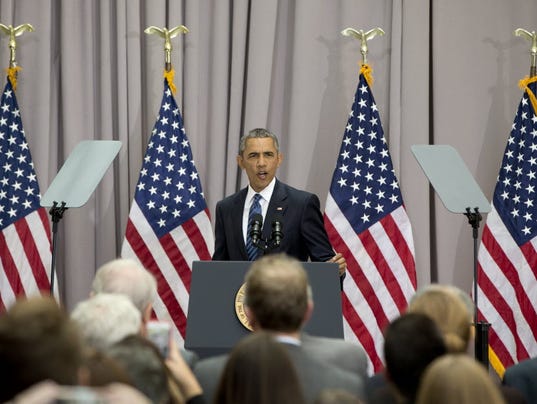
Kennedy sought a ban on atmospheric nuclear testing, which both sides had undertaken extensively and which created nuclear fallout problems. He negotiated the test ban as a formal treaty, and presented it to the Senate for ratification as the Constitution dictates. It sailed through in September 1963 by a vote of 80 to 19 with strong bipartisan support. By contrast, the Obama administration never sought to do the hard work of negotiating and ratifying a formal treaty with Iran, and the proposed pact faces strong bipartisan opposition on Capitol Hill. President Obama invoked the later SALT agreements with the Soviet Union, but his proposed Iran deal has lowerpublic approval than the SALT II treaty did before Jimmy Carter withdrew it from the Senate in 1980.(
President Kennedy's speech was publicly addressing Soviet strongman Nikita Khrushchev (who notably said “We will bury you”) in an attempt to get him to the negotiating table. President Obama's speech today targeted a small group of undecided members of his own political party who could mean the difference between his deal being rejected with a veto proof majority, or simply being rejected.
Kennedy was also not afraid to continue his pointed criticism of Soviet communism even while he sought détente. Two weeks after the American University address, Kennedy delivered his more famous, more combative “Ich bin ein Berliner” speech. “There are some who say in Europe and elsewhere we can work with the Communists,” Kennedy said. “Let them come to Berlin.” Kennedy’s muscular tone prompted Soviet leader Nikita Khrushchev to remark during his own speech in East Berlin two days later that "one would think that the speeches were made by two different Presidents." Obama made passing reference to Iran’s Islamic regime being repressive, but it hardly amounted to the soaring indictment of communism President Kennedy made in Berlin.
Kennedy was concerned that the Soviet Union might possibly start a senseless conflict, but Obama believes that his domestic political opponents are the ones threatening to start a senseless conflict. He characterized his deal as a peace agreement, because there is “no other option” than a U.S.-initiated war — even though no American leaders are advocating an immediate attack.
Obama is manufacturing a crisis that his pact does not solve. The agreement does not address Iran’s expansionist aims, its support for terrorism, its ballistic missile program or grim human rights record. Even if the proposed deal worked, which is doubtful, it would amount to a speed bump for Iran’s nuclear program that will simultaneously reward Tehran with tens of billions of dollars to invigorate its terror networks and missile programs.
President Obama quoted Kennedy saying that “the pursuit of peace is not as dramatic as the pursuit of war.” But Obama's argument that war is the only alternative is what is creating drama. There are many better alternatives to his Iran pact that do not involve armed conflict. The stakes are much lower than they were in 1963. This is not the height of the Cold War. Iran is not the Soviet Union. And Barack Obama, is no John F. Kennedy.
James S. Robbins writes weekly for USA TODAY and is the author of The Real Custer: From Boy General to Tragic Hero.



